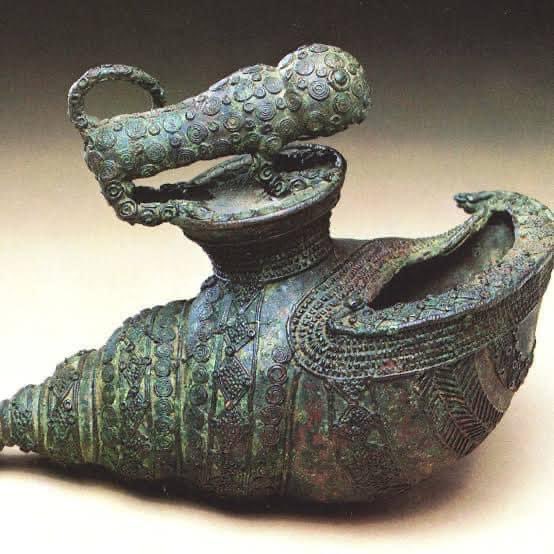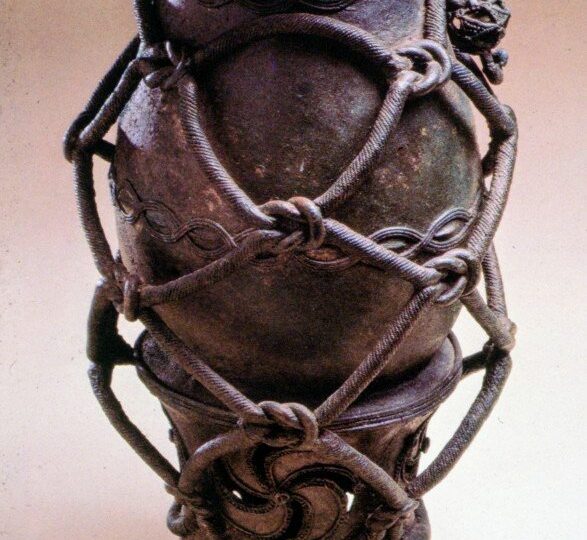In 1938, a simple act of digging a well led to one of Africa’s most breathtaking archaeological discoveries. In the small town of Igbo-Ukwu, located in southeastern Nigeria, a local villager stumbled upon a collection of mysterious bronze artifacts buried beneath the earth.
At first glance, these items — intricate jewelry, vessels, tools, and ceremonial objects — stunned everyone with their beauty and craftsmanship. No one could have imagined that such advanced metalworking existed in West Africa centuries before European contact.
Professional excavations later confirmed that these artifacts dated back to the 9th century CE. This revelation challenged prevailing ideas about African history and civilization.
What Was Found at Igbo-Ukwu?
The site of Igbo-Ukwu revealed three main areas of discovery: a burial chamber, a shrine, and a cache of objects. Each area was rich with artifacts that spoke volumes about the society that created them.
The burial chamber contained the skeleton of a high-ranking individual, believed to be a priest or a king. Surrounding the body were elaborate grave goods, including:
- Exquisitely detailed bronze vessels and bowls
- Beads made of glass, carnelian, and stone
- Scepters, crowns, and other regalia
- Elephant tusks and other items symbolizing wealth and power
In the shrine area, archaeologists unearthed ritual vessels, many shaped like animals and mythical creatures. These objects suggested a complex spiritual belief system and sophisticated artistic vision.
The cache site held additional bronze artifacts, tools, and ornaments, all created with astonishing skill and precision.

The Craftsmanship That Amazed the World
One of the most remarkable aspects of Igbo-Ukwu was the sheer technical mastery displayed in the artifacts. The bronzes were produced using the lost-wax casting technique — a complex process requiring a deep understanding of metallurgy.
The level of detail in the objects was breathtaking. Delicate chains, fine filigree patterns, and lifelike animal depictions showed that the Igbo-Ukwu artisans were masters of their craft.
What made it even more astounding was that these artifacts predated similar works in Europe by several centuries. While European art was still in its early medieval stages, Igbo-Ukwu was flourishing with intricate metalwork and global trade connections.
A Glimpse Into a Sophisticated Society
The Igbo-Ukwu findings reveal more than just technical skill; they offer insights into a highly organized and wealthy society. The sheer quantity and quality of the grave goods suggest the existence of a social hierarchy, religious institutions, and thriving trade networks.
The presence of materials like glass beads and carnelian — which were not locally available — indicates that Igbo-Ukwu participated in long-distance trade. These goods likely traveled from North Africa, the Middle East, and even as far as India, showing that ancient West Africa was far from isolated.
The discovery also suggests that spiritual and religious life played a significant role. The shrine artifacts point to elaborate rituals and a strong priestly class that wielded considerable influence.
Why Was the Igbo-Ukwu Find So Important?
Before the discovery at Igbo-Ukwu, mainstream historical narratives often portrayed Africa as a continent without significant civilizations before European arrival. The Igbo-Ukwu artifacts shattered this falsehood.
This archaeological site provided undeniable proof that sophisticated societies existed deep within Africa centuries before colonization. It challenged stereotypes and demanded a reevaluation of African contributions to world history.
Moreover, it demonstrated that technological and artistic excellence was not imported from Europe or the Middle East. African societies had developed their unique, highly advanced systems independently.
Changing the Global Perspective on African History
The importance of Igbo-Ukwu extends beyond Nigeria or even Africa. It serves as a powerful reminder that human innovation and culture are universal.
The artifacts forced historians and archaeologists to confront biases that had long minimized Africa’s role in global civilization. The discovery helped ignite new scholarly interest in African history, leading to deeper studies of ancient empires like Mali, Ghana, and Great Zimbabwe.
Today, Igbo-Ukwu stands as a symbol of African ingenuity, creativity, and sophistication. It reminds the world that Africa has always been a cradle of human achievement.
The Role of Archaeologist Thurstan Shaw
Much of what we know about Igbo-Ukwu today is thanks to the work of British archaeologist Thurstan Shaw. In the 1950s and 1960s, Shaw led professional excavations at the site.
His meticulous methods and respect for local history set new standards for African archaeology. Shaw’s research confirmed the site’s age through radiocarbon dating and placed it firmly in the 9th century CE — long before many European cities had reached similar levels of complexity.
Without Shaw’s dedication, much of the story of Igbo-Ukwu might have remained buried and forgotten.
Preserving the Legacy of Igbo-Ukwu
Sadly, many of the artifacts discovered in 1938 were dispersed before proper documentation. Some were sold or lost. However, the items recovered through professional excavation are now preserved in Nigerian museums and international collections.
There is growing recognition of the need to protect and promote Igbo-Ukwu as a heritage site. Efforts are underway to create local museums, educational programs, and cultural festivals to honor this incredible history.
As more Africans and global citizens learn about Igbo-Ukwu, the site’s significance continues to grow.
A Treasure Beyond Measure
The discovery at Igbo-Ukwu is not just an archaeological marvel; it is a testament to the enduring spirit of African civilizations. The sophistication, artistry, and cultural depth found beneath the soil of southeastern Nigeria challenge outdated narratives and celebrate a legacy of excellence.
Igbo-Ukwu teaches us that history is richer, deeper, and more interconnected than many once believed. It reminds us that the human story is a global story — and Africa’s role in it is as vibrant and vital as any other.
Through continued study and preservation, the treasures of Igbo-Ukwu will inspire generations to come, shining a bright light on Africa’s brilliant past and its limitless future.

